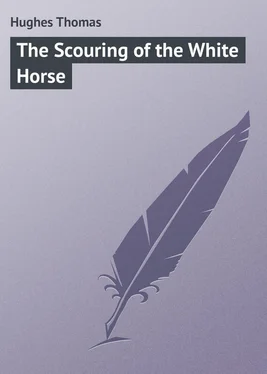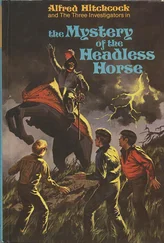Thomas Hughes - The Scouring of the White Horse
Здесь есть возможность читать онлайн «Thomas Hughes - The Scouring of the White Horse» — ознакомительный отрывок электронной книги совершенно бесплатно, а после прочтения отрывка купить полную версию. В некоторых случаях можно слушать аудио, скачать через торрент в формате fb2 и присутствует краткое содержание. Жанр: foreign_prose, на английском языке. Описание произведения, (предисловие) а так же отзывы посетителей доступны на портале библиотеки ЛибКат.
- Название:The Scouring of the White Horse
- Автор:
- Жанр:
- Год:неизвестен
- ISBN:нет данных
- Рейтинг книги:5 / 5. Голосов: 1
-
Избранное:Добавить в избранное
- Отзывы:
-
Ваша оценка:
- 100
- 1
- 2
- 3
- 4
- 5
The Scouring of the White Horse: краткое содержание, описание и аннотация
Предлагаем к чтению аннотацию, описание, краткое содержание или предисловие (зависит от того, что написал сам автор книги «The Scouring of the White Horse»). Если вы не нашли необходимую информацию о книге — напишите в комментариях, мы постараемся отыскать её.
The Scouring of the White Horse — читать онлайн ознакомительный отрывок
Ниже представлен текст книги, разбитый по страницам. Система сохранения места последней прочитанной страницы, позволяет с удобством читать онлайн бесплатно книгу «The Scouring of the White Horse», без необходимости каждый раз заново искать на чём Вы остановились. Поставьте закладку, и сможете в любой момент перейти на страницу, на которой закончили чтение.
Интервал:
Закладка:
“They do,” said he, “and that his blood made a pool on the top, and ran down the steps on the other side, where the grass has never grown since. This is another curious instance of the tenacity of tradition; but here I think our good folk in the Vale have held on to the name, or a part of it, and forgotten the meaning, just as they have in the case of another village over there in Oxfordshire, the name of which is Stanton Harcourt.”
“How was that, Sir?” said I, when he paused.
“Well,” said he, laughing, “an old man in that village told me that a battle was fought there, which the English were very near losing, when the general rode up to one of his captains, named Harcourt, who was in the thick of it, and called out, ‘Stan’ to un, Harcourt, stan’ to un, Harcourt;’ and that Harcourt won the battle, and the village has been called Stanton Harcourt ever since. Now, as to that mound, I believe it’s right name to be Pendragon’s Hill. Pendragon, you know, is only a name common to those of the kings of the ancient Britons, who were chosen leaders in the time of national distress, and means nothing more than ‘caput regum,’ ‘the chief of kings.’ According to some, ‘Arthur’ is the same or a like word, being ‘Ardh-reg’ or ‘Ard-heer,’ and meaning ‘summus Rex’ (whence the ‘Arviragus’ of Juvenal; but I lay no stress on this). Now we know of at least three Pendragons. There was Cassibelan, who was chosen Pendragon at the time of Julius Cæsar’s invasion, Uter Pendragon, and Arthur Pendragon; which Uter and Arthur were, without doubt, chosen to resist the Saxons, who had won already the eastern part of the island. And if Arthur and Pendragon are the same words, doubtless (as has been well supposed), there were many Arthurs at this time, one of whom was probably slain in battle and buried here. 2 2 E. Martin Atkins, Esq., of Kingston Lisle, has lately been opening the barrows which are nearest to the Horse; and the compiler, hearing that he was about to examine Dragon’s Hill also, wrote to him on the subject, and suggested how desirable it would be (if any ways possible) to find the remains of King Bægseek there who was slain at Ashdown. To which communication the compiler received the following reply. After mentioning the contents of the other barrows, some clearly Saxon, others Romano-British, his letter proceeds as to Dragon’s Hill: — “As for old Bægseek, I should chuck him overboard at once, and assume that our friend Uter Pendragon’s remains had been originally deposited here, but that he had been disturbed in his repose by the decapitation of the barrow, which at some unknown time has undoubtedly taken place. It is unfortunate, however, that a Roman coin of the time of Constans turned up from among the débris, and the fragments of pottery also were chiefly of Roman manufacture, mixed with some of earlier date. It will therefore perhaps be difficult to reconcile these matters one with the other; but on turning them over in your mind, you will, I dare say, theorize with a very agreeable correctness !” What is a wretched compiler to do, who gets such letters from those who should be his aiders and abettors?
For in the Saxon annals we find that Cedric, founder of the West Saxon kingdom, slew Natan-leod and five thousand men in these parts, which Natan-leod (as is shown by Mr. Baxter) is ‘Naud-an-ludh,’ or ‘populi tutela,’ the people’s refuge; in fact, a kindred word to ‘Pendragon,’ or ‘Arthur.’ You see how probable this would be primâ facie ?” said he, turning round to me.
My goodness! I couldn’t make out head or tail of his long words, and was staring at him with my mouth open; but when he turned round I shut it pretty quick, and looked as wise as I could. “Well, Sir,” said I, “I hardly know; but it doesn’t look unlikely, does it?”
“Of course not,” said he, quite pleased; “and as the Britons were not driven from these parts till the middle of the sixth century, I should put the throwing up of Dragon’s Hill in the beginning, say the first half, of that century. Now, in the year A.D. 520, according to Gildas and Bede, Arthur gained his twelfth victory at ‘Mons Badonicus,’ which might very well be Baydon Hill, which you see over there.” And he pointed to a hill three or four miles off.
“But then, Sir,” said I, “if he gained the victory, he wasn’t killed there, I suppose, and so he couldn’t be buried here.”
“But he was killed in battle at last,” said he; “and, as I told you, there must have been many Arthurs or Pendragons just at that time, and many battles fought between this and Bath – why, the Britons gained a battle at Wanborough, over there, as late as A.D. 581.”
“But, Sir,” said I, “if Pendragon was buried down there, wouldn’t they have been very likely to cut out the horse up here just above, as another monument, at the same time; and then what becomes of King Alfred and the Danes?”
“There is no instance of two such monuments over one chief,” answered he, quite positive; but I thought I saw him give a twinkle with his mouth, as if he felt I had been pretty near him. “Besides, as I said before, the tradition as to the White Horse is too strong to be upset by conjecture.”
“I didn’t mean to conjecture, I’m sure, Sir,” said I; and I thought, though I didn’t say so, it was he who had been conjecturing pretty freely, if it came to that. “The battle of Ashdown, Sir, was a very great battle then,” I went on, for I liked to hear him talk about those old times, though I didn’t quite understand all he said.
“The greatest battle probably in which Alfred ever was,” said he.
“Please, Sir,” said I, “I hope you won’t think me troublesome, but if you would only tell me about the battle I should be so much obliged to you.”
“Sir,” said he, looking at me rather surprised, “it is seldom that I can get any of the youth of this day to take an interest in these matters, the study of which would greatly benefit their manners and morals. I shall be pleased to do what you wish. Are you a good listener?”
“Yes, Sir,” said I, “you will get tired of talking long before I shall of listening. And you wouldn’t mind, I hope, my taking notes of the story?”
“By no means,” said he; “I see you are ready with your pen. Perhaps I shouldn’t have told you so much about Pendragon and Natan-leod if I had seen that you were taking me down; but now I will be careful to give you nothing which is not to be found in the most trustworthy chroniclers. Are you ready?”
“Yes, Sir,” said I; and then he settled himself in the turf, and pulled a couple of old brown books out of his long coat-tail pockets, to which he sometimes referred, and looking out over the Vale, as if he were travelling in his mind far away from me and every thing about us on the hill-side, began as follows.
“As for old Bægseek, I should chuck him overboard at once, and assume that our friend Uter Pendragon’s remains had been originally deposited here, but that he had been disturbed in his repose by the decapitation of the barrow, which at some unknown time has undoubtedly taken place. It is unfortunate, however, that a Roman coin of the time of Constans turned up from among the débris, and the fragments of pottery also were chiefly of Roman manufacture, mixed with some of earlier date. It will therefore perhaps be difficult to reconcile these matters one with the other; but on turning them over in your mind, you will, I dare say, theorize with a very agreeable correctness !” What is a wretched compiler to do, who gets such letters from those who should be his aiders and abettors?
CHAPTER III
Nearly a thousand years ago, in the year of our Lord 871, the great battle of Ashdown was fought; but, in order to give you a true idea of its importance, I must begin my story some years earlier; that is to say, in the year of our Lord 866. In this year Æthelbert, king of the West Saxons, died, having ruled his kingdom for five years in peace, with the love of his subjects; and Æthelred, his next brother, who succeeded him, buried his body in Sherborne Minster. In this year Alfred, the younger brother, who afterwards succeeded Æthelred, and was called Alfred the Great, reached his seventeenth year. In the autumn a great army of pagan Danes came over to Britain, and landed in that part of the island which was then called East Anglia, but now Norfolk. These were not the first Danes who had come over to vex England, but none of them ever stayed so long, fought so many battles, or did so much harm (as we should say, speaking according to man’s judgment) as these.
Читать дальшеИнтервал:
Закладка:
Похожие книги на «The Scouring of the White Horse»
Представляем Вашему вниманию похожие книги на «The Scouring of the White Horse» списком для выбора. Мы отобрали схожую по названию и смыслу литературу в надежде предоставить читателям больше вариантов отыскать новые, интересные, ещё непрочитанные произведения.
Обсуждение, отзывы о книге «The Scouring of the White Horse» и просто собственные мнения читателей. Оставьте ваши комментарии, напишите, что Вы думаете о произведении, его смысле или главных героях. Укажите что конкретно понравилось, а что нет, и почему Вы так считаете.












